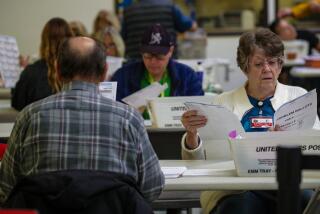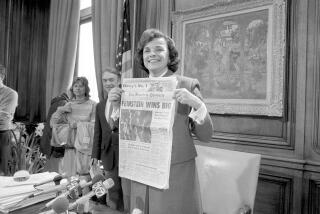Dole’s Decision : Why She’s Quitting to Hit the Campaign Trail
- Share via
WASHINGTON — “Let me tell you about those,” Elizabeth Dole said cheerily, pointing to a dozen red roses in the office where she has served as the first woman secretary of transportation.
Dole had just taken part in an outdoor ceremony celebrating the Constitution, returned to her office, gobbled lunch in 15 minutes and greeted a reporter. She looked perfect. She was already at full throttle.
She picked up a tiny greeting card from her massive, orderly desk. “It says, ‘We’re going to miss you dearly. May God bless you and the senator. Love,’ and then it’s signed from all the people from the Coast Guard mess,” she said.
“Isn’t that sweet that they would do that? People do a lot of thoughtful things. It pulls at the heartstrings because we’re a family here.”
Heartstrings have been going twang around Dole for years. She is both a Harvard-trained lawyer and a former campus beauty queen from Duke University in her native North Carolina. At 51, she continues to mesh those distinctly different attributes into a uniquely popular political presence. She has been making friends and climbing the political ladder to increasingly better jobs since she hit Washington, working for President Lyndon B. Johnson in 1968.
Career Departure
And so it seemed to be something of a career departure for her this week when Dole, the Reagan Administration’s only female Cabinet officer and a political force in her own right, announced that she will resign Oct. 1 to hit the campaign trail for her husband, Kansas Republican Bob Dole, who happens to be GOP leader of the Senate.
“I instinctively want to be with my husband when he makes his announcement and really officially becomes a candidate,” she said Wednesday.
If some feminists view that as a dispiriting bow to the traditional wifely role in political campaigns, Dole doesn’t agree.
“We’re talking about who is going to be the leader of the Free World, the person who is going to sit across from Mr. Gorbachev,” she argued. “That’s a challenge. That’s something I believe in strongly.”
She insists she finds great similarity in that task and the job she is wrapping up--overseeing a department that is grappling with such heavyweight issues as airline and automobile safety.
“There is no joy, no reward like going home from work and saying, ‘We saved some lives today,’ ” she maintained, talking and smiling at the same time like a beauty pageant contestant answering the Big Question.
Her husband’s supporters, she explained, had been pressuring her to give the campaign more of her attention. They literally could not wait to launch her considerable charm to destinations all over America--to farms, suburbs, colleges and business meetings where she already has proven to be an irresistible campaigner.
Finally she decided they were right. It was time to go full-bore on the campaign trail. Her campaigning skills are simply too good to waste. A few thousand votes in a critical state can sometimes make the difference, she indicated, and she would never forgive herself if she hadn’t gone out and tried to get those votes for her husband.
“This is not giving up my career just to sort of stand by his side,” Dole said. “I mean, this is going to be a very active role that I’ll be playing in the campaign. And to me it’s giving up one cause and taking up another.
“My feeling always has been that there are many ways in which you move forward. You don’t have to be in a paid position . . . to learn, to grow, to have challenging experiences.”
Some feminists disagree. “I think it’s sexism rearing its head one more time,” fumed Irene Natividad, president of the bipartisan National Women’s Political Caucus. “Why should she have to resign (from the Administration) and (Vice President George) Bush not have to, just because she’s a spouse and a dynamite weapon for the campaign?”
But aren’t the opportunities offered a First Lady equally important as those of a high government official?
“Maybe in Elizabeth Dole’s mind,” said Natividad, “but for me, no. To me it looks like a tremendous sacrifice.”
But former vice presidential candidate Geraldine Ferraro thinks Dole made the right decision--and a predictable one. “I think it’s a situation that if reversed--if he were the Cabinet secretary and she were running--I don’t doubt they would have exerted the same pressure on him to resign.”
William Schneider, a political analyst for the American Enterprise Institute, said it was appropriate for Dole to resign to avoid a conflict of interest. The difference between her and Bush, a candidate for President himself, is that “he’s elected and she’s appointed,” he said.
It’s not the first time Dole has quit a high post to campaign for her husband: In 1979, she resigned as a member of the Federal Trade Commission as Bob Dole prepared for the 1980 presidential campaign. So she knows from experience that even an unsuccessful presidential bid will not mean the derailment of her career.
If anything, maintained an aide to Elizabeth Dole, the national campaign exposure may be of benefit to a Republican woman with her resume and charisma. “I think again if your goal is to make a difference for people there are a number of ways that can spin out if he were not the President,” Dole herself said.
Dole said she has “no plans” to run for office if her husband does not win the Republican nomination, but she made it clear she’s not ruled that out, either. A law passed in 1967 would prohibit her from serving as a member of his Cabinet, but she would undoubtedly bring new substance to the role of First Lady.
Stumping the South
During the campaign, she will be relied upon heavily in the key Southern states, where she is likely to be popular with her pleasing Carolina drawl. The campaign wants her to work out of a “Super Tuesday” office in North Carolina and make a 12-state tour right away, she said. She can’t wait, she added, “to roll up my sleeves.”
Isn’t there anything she doesn’t like about campaigning? “The people buoy you up,” she said.
One Dole aide noted that she and Rep. Jack Kemp (R-N.Y.) will be the only major Republican campaigners younger than 60, and it is hoped that she may help capture for the 64-year-old senator some of the youth vote considered key to a Republican victory in 1988. It goes without saying that Elizabeth Dole is one of the few Republican magnets for the feminist vote, even though she abandoned her support of the equal rights amendment when she joined the Reagan Administration.
Her resignation as transportation secretary comes at a time when criticism of her was beginning to surface. A recent nationally syndicated column by Rowland Evans and Robert Novak suggested that she was flying around the country, sometimes at taxpayer expense, to mix campaign duties with departmental work, even as concerns about air safety had reached crisis proportions.
Dole bristles at mention of the column, disputing several of its points, and insists that criticism by Evans and Novak and others had not figured in her decision to resign. “Not at all, it absolutely did not,” she said.
(A source close to Dole noted that she dismissed Evans and Novak as supporters of rival Kemp. She also was angry that her hours of campaign travel were singled out for criticism while Bush’s were not.)
“I’m not sure why I would be asked (about campaigning) but I don’t see anyone asking the candidates,” she said. “It is strange, isn’t it?”
Mounting Criticism
A profile in this month’s issue of the feisty Washington Monthly magazine was headlined: “Charming Her Way to the White House: Air Travel Stinks, Auto Safety Is a Joke--and Washington Still Loves Liddy Dole.” And other criticisms had trickled out about her job performance, hitting on the theme that she emphasized public relations over action.
Rep. Norman Y. Mineta (D-San Jose), chairman of a House subcommittee on aviation, has been a critic, saying he was “disappointed with her ability to follow through on her rhetoric with concerted actions.” And Rep. Guy Molinari (R-N.Y.) goes further, saying that Dole had done a “poor” job as transportation secretary and had “failed in her roles of advocacy and going out and stating the true needs of the (airline) system.
“She’s a very bright, very articulate woman, very convincing and I think that misled a lot of members of Congress,” Molinari said. “She’s very good at public relations.”
Dole maintains that her record at the department is “solid,” repeatly asserting that the last three years have been the safest in U.S. history for the four major modes of transportation: airplanes, automobiles, trains and boats. She extolled the virtues of airline deregulation, saying it had brought down ticket prices to a range where the average American could afford them.
Dole did not feel forced to resign, she said, either by criticism, or by possible conflict of interest problems. “It is not necessary to leave. It is my personal choice.”
When his campaign approached her last week, she said, she realized she had reached a point “where rubber hits the road, that there’s a conflict where you can’t see how you can handle it and put the department first, which I must do.”
Represented Indigents
Dole first worked in Washington for the Johnson Administration in the Department of Health, Education and Welfare, organizing a conference on the education of the deaf. Before that, she had practiced law for a year, representing indigents, after working summer jobs during school at the United Nations and in the Peace Corps.
In 1968 Johnson hired her for his Committee on Consumer Interests, and she surprised co-workers when she stayed on to work for Republican Richard M. Nixon, whose consumer policies were decidedly different. President Nixon appointed the industrious Dole to a seven-year term on the five-member Federal Trade Commission in 1973, and she resigned after six years to campaign for her husband, whom she had married in 1975.
She rebounded after his defeat by working in the Reagan campaign, on the new President’s transition team and landing jobs with the administration, first heading the White House office of public liaison, and then succeeding Drew Lewis as transportation secretary in 1983.
As for what she would do as First Lady, Dole paid homage to the “traditional role” but added, “It would be important to me to feel I’ve got an area where I can really roll up my sleeves and make that difference for people.
“Maybe there is a way to carve out certain areas where I could have some input, where I’ve had experience. I think certainly with the years I’ve spent in transportation and the expertise I’ve gained in that, there should be a way to continue to be involved in those issues.”
For now, though, she has what she calls “full-time single-minded focus” on the job at hand, campaigning for her husband. Few doubt that the irrepressible Elizabeth Dole will do it well.
“If I were Barbara Bush,” Natividad said, “I’d be quaking in my boots.”
More to Read
Get the L.A. Times Politics newsletter
Deeply reported insights into legislation, politics and policy from Sacramento, Washington and beyond. In your inbox three times per week.
You may occasionally receive promotional content from the Los Angeles Times.










